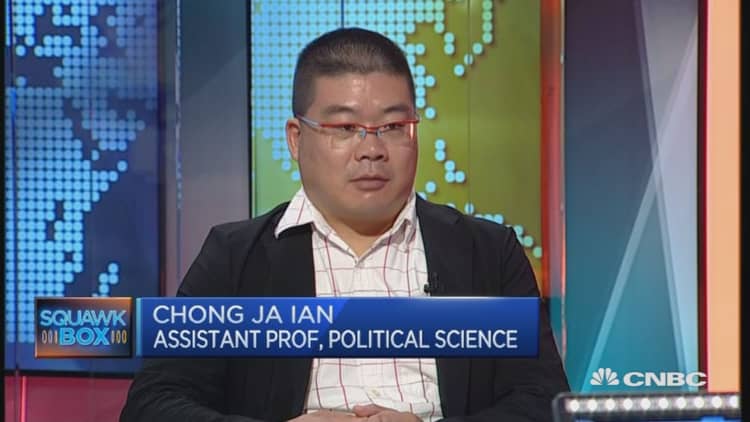
A spike in tensions will hang over Hong Kong's usual July 1 commemoration of the handover from the U.K. to China, an event which includes both official celebrations and a protest march.
The 19th HongKong Special Administrative Region Establishment Day this year follows recent events viewed as a curtailment of personal liberties, with Beijing flexing influence on its special administrative region despite a pledge to maintain a "One Country, Two Systems" approach to governing Hong Kong.
Beijing's actions seem to undermine its pledge, in turn fueling pro-independence and localist sentiment in Hong Kong, with a series of recent events stoking tensions.
"China's current Hong Kong policies may contradict its broader, longer-term interests, but those concerns seem to have taken a back seat under the current political climate. The here and now is far more important," said Chong Ja Ian, a political science professor at National University of Singapore (NUS).
"They apparently view the imperative and urgency of maintaining control as trumping all these other considerations."
Among recent incidents, earlier this month, Lancome was forced to close its shops in the city for a day amid protests by hundreds of demonstrators, sparked by the French beauty company's decision to pull the plug on a concert featuring pro-democracy singer Denise Ho. Protesters complained the firm was bowing to pressure from Beijing.
Concerns over personal freedom were compounded by the disappearances earlier this year of several people in Hong Kong who were linked to a local publisher critical of Beijing's leadership. One of the booksellers said recently that he had .
In an incident on the first day of Lunar New Year this year, riot police were deployed to control a ballooning crowd protesting government officials' clearing of illegal street vendors at a central intersection.
Hostilities quickly escalated overnight into a violent clash. Protesters threw large objects and bricks pried from the sidewalks at the police, who had initially fired warning shots and then used pepper spray and batons on protesters. The event was dubbed the Fishball Revolution as the police action against local-food hawkers was seen as a crackdown on local culture and identity.
That protest followed the Umbrella Revolution, which started in September 2014 and saw thousands flood the streets and camp on major roadways, blocking traffic for months, to protest proposed changes to Hong Kong's electoral system. In a move protesters saw as a breach of the "One Country, Two Systems" policy, China planned to screen all nominees in the first direct elections for Hong Kong's leader, due to be held in 2017. The government eventually cleared protesters' tent city, without offering any concessions.
The tension between the two systems comes amid an economic and political transition in China, triggering insecurity within the Communist Party over its own regime even as Chinese capabilities and state capacity seem at their strongest in more than a century, said NUS' Chong.
"It is easy for Beijing to interpret Hong Kongers' efforts to push for greater political liberalization, participation and representativeness as an affront to its will and plans for Hong Kong. Compromise on Beijing's part could trigger the Beijing leadership's fears of looking soft," he told CNBC.
"That the push for greater political liberalization in Hong Kong, but also Taiwan, could inspire sympathy inside China is likely to make Beijing's top leaders feel even more uneasy."


